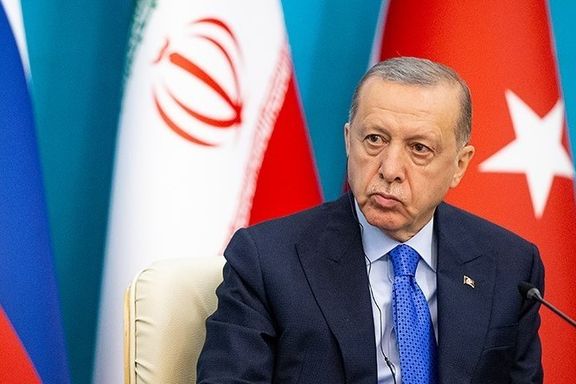Back From Iran, Turkey’s Erdogan Mulls Syria Offensive

Turkey’s President Tayyip Erdogan has returned from the three-way summit in Tehran with the option of an offensive against Syrian Kurds firmly on his agenda.

Turkey’s President Tayyip Erdogan has returned from the three-way summit in Tehran with the option of an offensive against Syrian Kurds firmly on his agenda.
Erdogan told reporters on the return flight that the leaders of Russia and Iran shared Turkey’s concern with confronting ‘terrorism.’ While Erdogan, President Vladimir Putin and Iranian leader Ali Khamenei all agreed that the United States should withdraw its troops from north-easy Syria, where they control some oil-fields, both Putin and Khamenei cautioned the Turkish president against an attack on Kurdish forces.
According to a text released by the presidential office, Erdogan continues to insist that an offensive against the main Kurdish group, the PYD (Democratic Union Party), remains possible as long as Turkey’s ‘security’ concerns are not met.
Russia, Turkey, and Iran have worked to coordinate their various interests in Syria through the Astana process, which began in 2019. But with 3.5 million refugees in Syria and a swathe along the border under Kurdish control renamed ‘Rojava,’ Erdogan reiterated Tuesday the option of establishing a ‘safe zone’ inside Syria.
The PYD is linked to the Kurdistan Workers Party (PKK), which has been active mainly in Turkey since the 1980s, and to Pejak, which operates in Iranian Kurdistan. The three share the ultimate aim of one Kurdistan uniting areas from Turkey, Iraq, Syria, and Iran.
But if Ankara and Tehran share antipathy to Kurdish autonomy, they have taken opposite sides in the Syrian war, with Iran alongside Russia backing President Bashar al-Assad and Turkey aiding mainly Sunni rebels.
The PYD has long played an on-off game with Assad, given a general Kurdish antipathy towards mainly Arab Sunni militants. Erdogan Tuesday accused the PYD of “draining” Syria petrol and selling it to Assad’s government. The PYD has also been aided by the US, ostensibly because of its role fighting the Islamic State group (Isis).
Words ‘not enough’
The trilateral summit in Tehran, which dealt with issues including food supplies arising from the Ukraine crisis, showed Erdogan’s dissatisfaction with what is becoming a settled situation in northern Syria.
“You say you understand Turkey’s concerns and we thank you for this,” Erdogan reportedly told Putin and Raisi. “But words alone are not enough.”
But the summit was also an opportunity for Erdogan to meet Putin who for the first time left the former Soviet space. The Turkish president also made Putin wait nearly one minute in an awkward situation before he appeared and greeted him for a bilateral meeting. Many saw this as a payback for all the occasions when the Kremlin boss has made Erdogan and others wait for him.
Iran’s formal position is that all concerned should respect international borders. Khamenei warned Tuesday that ‘terrorism’ in Syria was not limited to one group and that any Turkish intervention would “benefit terrorists,” destabilize the region, and “impede Syria’s political actions.” Iran may be concerned that a Turkish military operation, and the possible return to Syria of radicalized Sunni refugees, could willingly or otherwise strengthen Islamists opposed to Assad.
“We emphasised that the Syrian government must have control over all areas in the country,” Iranian President Ebrahim Raisi told a press conference following the summit.